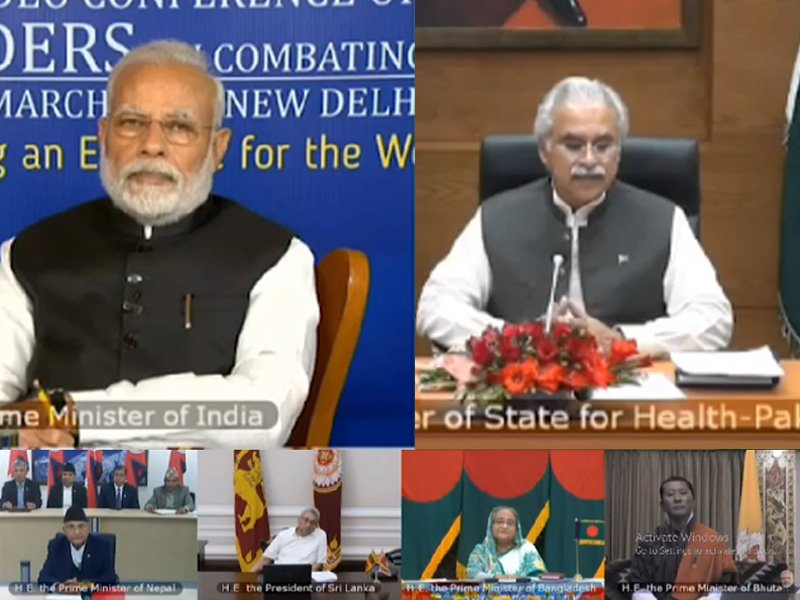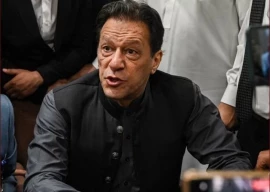
SAARC states back unified virus response
Pakistan wants bloc’s secretariat to lead COVID-19 fight instead of India
ISLAMABAD: Leaders from the South Asian Association for Regional Cooperation (SAARC), which has long remained dysfunctional because of an acrimonious relationship between Pakistan and India, held a virtual summit on Sunday to chalk out a common strategy for combatting the novel coronavirus that has spread to over 150 countries up till now.
All member states agreed that a coordinated and joint effort was needed to tackle the pandemic which is spreading rapidly throughout South Asia particularly in Pakistan and India. The understanding for collaborative efforts was reached during a video conference of SAARC leaders convened at the proposal of Indian Prime Minister Narendra Modi.
However, unlike other members, who were represented either by the heads of state or heads of government, Pakistan deputed Dr Zafar Mirza, the PM'S special assistant on health for the virtual summit. Although, Pakistan attended the conference, it was evident from Dr Mirza's statement that Islamabad wanted the SAARC Secretariat, based in Kathmandu, Nepal, to lead the regional fight against Covid-19 instead of India.
Virus fear resurrects moribund SAARC
The PM's special assistant also used the SAARC conference to call for lifting of all locked downs and communication blackouts from the Indian Occupied Kashmir (IOK) in view of the health emergency.
"It is a matter of concern that COVID-19 cases have been reported from IOK and in view of the health emergency, it is imperative that the locked down in the disputed territory must be lifted immediately," Mirza said in a written speech as Modi apparently looked perturbed.
"Opening up communications and movement would facilitate dissemination of information, allow distribution of medical supplies and enable containment and relief efforts to proceed unimpeded," he added.
Soon after Mirza’s remarks, Indian commentators began accusing Pakistan for raising political issues on the SAARC forum when the region needed to focus on fighting the corona virus. However, Pakistani officials justified the approach, saying that the flow of information from IOK was the key to get a full picture of the corona virus situation.
It is pertinent to mention that IOK has remained under lock down since August 5 last year when India revoked the special status of the disputed territory.
Towards the end of the conference, Mirza said the COVID-19 pandemic is a global health emergency, the likes of which have not been witnessed in the past century.
"At the same time, while it has been characterized as global pandemic, it is deemed ‘controllable’ as well," he added. "Pakistan shares the common concern over the potential of Covid-19 affecting South Asia."
Mirza also said the WHO's four-pronged advice offers a reasonable way forward, namely: (a) preparation and readiness; (b) detection, prevention and treatment; C) reduction and suppression; and (i) innovation and improvement.
Pakistan has been involved in containment efforts right from the outset of the outbreak. "We have been alert to the dangers, and have put in place appropriate protocols for the safety and health of our people,” said Mirza. "We have been matching our measures to real-time threat assessments. While, we have stressed the need for caution, we have strongly advised against panic."
He concluded that Prime Minister Imran Khan was personally overseeing these efforts, highlighting the steps Pakistan took to control the pandemic. He listed four pillars of response strategy include: (A) Governance and Finance; (B) Prevention; (C) Mitigation; and (D) Communication.
"Resultantly, Pakistan has managed so far to contain, an achievement the WHO has recognized and commended,” he said.



1724319076-0/Untitled-design-(5)1724319076-0-270x192.webp)





1735025557-0/Untitled-(96)1735025557-0-270x192.webp)











COMMENTS (3)
Comments are moderated and generally will be posted if they are on-topic and not abusive.
For more information, please see our Comments FAQ